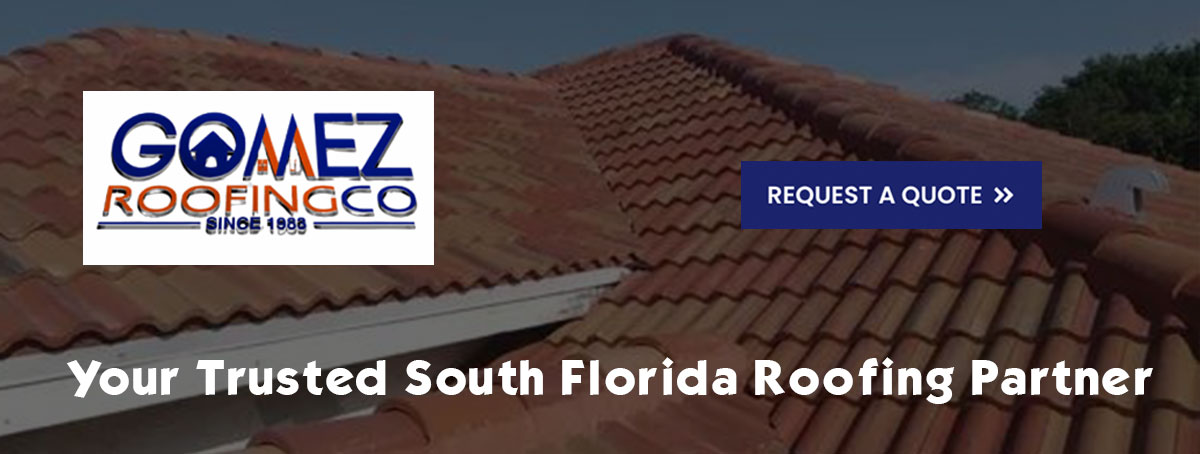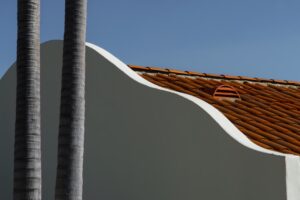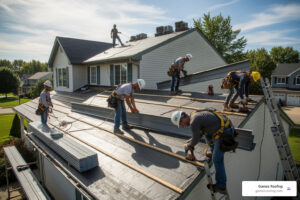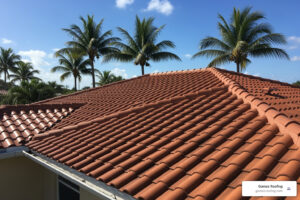Table Of Contents:
- What Are the Different Types of Roofing Warranties Available in Pompano Beach?
- What Does a Roofing Warranty Typically Cover and Exclude?
- How to Choose the Right Roofing Warranty for Your Home in Pompano Beach?
- How Does the Florida Building Code Impact Roofing Warranties in Pompano Beach?
- What Is the Process for Filing a Roofing Warranty Claim in Pompano Beach?
- How Do Roofing Materials Influence Warranty Options and Coverage?
- Why Is Regular Roofing Inspection and Maintenance Important for Warranty Protection?
- Frequently Asked Questions
Roofing warranties are not only a promise of quality workmanship but an essential investment in protecting one’s home from unexpected damages and water-related issues. Homeowners in Pompano Beach face unique environmental challenges such as high humidity, tropical storms, and seasonal temperature extremes, making it critical to choose the right warranty that offers extensive protection and peace of mind. This guide explains the different types of roofing warranties available, what each covers and excludes, and how the Florida Building Code and roofing materials influence options. It also details the process for filing warranty claims and provides maintenance best practices, ensuring that homeowners in Pompano Beach make an informed decision.
Understanding roofing warranties is crucial for budgeting future repairs and avoiding costly water damage incidents. A warranty represents the commitment to durable materials, professional installation, and long-term customer satisfaction. With several warranty types available covering material defects, workmanship issues, and extended service conditions, homeowners must carefully evaluate their options. This guide highlights standard warranty durations, common exclusions related to natural events, and the benefits of regular maintenance. Staying updated with warranty terms and maintenance tips is imperative as roofing solutions and regulations evolve.
By the end of this article, homeowners will understand how to compare warranty options, ask the right questions, and select a roofing warranty that meets both their needs and local building codes.
What Are the Different Types of Roofing Warranties Available in Pompano Beach?
Roofing warranties generally fall into three categories: manufacturer warranties, contractor warranties, and extended warranties. Each type offers protection for different aspects of your roofing system, allowing you to choose coverage that aligns with material quality, workmanship, and long-term protection.
What Is a Manufacturer Roofing Warranty and What Does It Cover?
A manufacturer roofing warranty covers defects in the roofing materials themselves, such as premature granule loss, fading, or material breaks. In Pompano Beach, intense sun and high humidity can accelerate deterioration, and these warranties—often lasting 20–50 years—help ensure that the roofing materials meet strict durability standards. They may require specific maintenance protocols and are often transferable to future buyers. For instance, asphalt shingle warranties may include provisions for color retention and chalk resistance, underscoring their value in harsh climates.
How Do Contractor Roofing Warranties Differ From Manufacturer Warranties?
Contractor warranties focus on workmanship defects, covering issues such as improper installation, leaks, or structural failures. These warranties typically last between 5 and 10 years and address installation errors rather than material flaws. They are especially significant in regions like Pompano Beach where heavy rains and strong winds can cause unexpected leaks. Reputable contractors like gomez roofing Co emphasize quality control during installation, ensuring timely repairs and providing extra assurance against early failures.
What Are Extended Roofing Warranties and When Should You Consider Them?
Extended roofing warranties add protection beyond what manufacturer or contractor warranties provide. They offer comprehensive coverage against both material defects and workmanship issues—and sometimes include protection for damage from unforeseen circumstances if proper maintenance is conducted. Often lasting 10–20 additional years after the original warranty expires, these warranties may be ideal for high-end roofing materials such as metal roofs or tiles, where repair or replacement costs are significant. Though they involve extra cost, the broader coverage can reduce future out-of-pocket repairs.
What Does a Roofing Warranty Typically Cover and Exclude?

Roofing warranties detail both covered issues and exclusions. Understanding these details helps homeowners assess if a warranty suits their risk profile and maintenance capabilities.
Which Roofing Issues Are Covered: Materials, Workmanship, and Leak Protection?
Most comprehensive warranties cover material defects—such as asphalt shingle deterioration or premature metal corrosion—and workmanship issues like improper sealing, flashing, or underlayment errors. Leak protection is usually included to address water penetration caused by faulty installation. For example, if poorly installed flashing leads to a roof leak in humid conditions, the warranty obligates the contractor or manufacturer to fix the problem. Homes with clear workmanship warranties tend to experience fewer water damage incidents.
What Are Common Exclusions: Acts of God, Negligence, and Improper Maintenance?
Standard warranties typically exclude damage caused by Acts of God such as hurricanes or severe storms. They also do not cover damage resulting from homeowner negligence, including failure to maintain the roof or clear debris, and modifications made by unlicensed parties. Failure to perform regular inspections or minor repairs can void the warranty. Adhering to maintenance guidelines is essential to prevent gradual wear from becoming a costly issue.
How Do Local Weather Events in Pompano Beach Affect Warranty Coverage?
Pompano Beach’s tropical storms and high humidity can lead to accelerated roof wear. Some warranties may outline exclusions for wind-driven rain or severe UV exposure unless additional endorsements are purchased. For instance, a manufacturer warranty might cover normal UV exposure but exclude damage from wind-driven rain unless a rider is added. Tailored warranties that address local weather challenges can minimize warranty claims and provide more comprehensive protection.
| Coverage Aspect | Description | Typical Warranty Duration | Relevance in Pompano Beach |
|---|---|---|---|
| Material Defects | Defects in shingles, tiles, or metal panels. | 20–50 years | Protects against sun and salt air deterioration. |
| Workmanship | Issues from improper installation. | 5–10 years | Prevents leaks in high-humidity environments. |
| Leak Protection | Covers water penetration from installation errors. | Included in warranties | Averts water damage during tropical rains. |
| Acts of God | Extreme weather events. | Not covered | May require extra endorsements. |
| Maintenance Negligence | Damage from lack of upkeep. | Voids warranty if neglected | Emphasizes need for annual inspections. |
How to Choose the Right Roofing Warranty for Your Home in Pompano Beach?
Selecting a roofing warranty involves evaluating your home’s roofing system, available warranty options, and local conditions. Homeowners must balance cost, coverage, and reliability to minimize long-term risk.
What Factors Should Homeowners Consider When Selecting a Warranty?
Key considerations include the roof’s age and condition, the type of roofing material, and the manufacturer’s reputation. Local climate factors—such as the frequency of tropical storms and high humidity—also affect coverage needs. Additionally, understanding financial aspects like coverage limits and deductibles is critical. For example, older roofs or those with delicate materials like specific tiles may benefit from more comprehensive warranties covering both material and workmanship, while newer installations with durable materials might only require standard coverage. Assessing warranty transferability can also enhance resale value.
How to Compare Roofing Warranty Options Effectively?
Homeowners can compare warranty options by creating a checklist that includes warranty duration, coverage limits, exclusions, and after-service support. Consulting with reputable roofing contractors in Pompano Beach like Gomez Roofing Co can provide practical insights based on local experiences. Comparing fine print details side by side in a table can clarify which option offers the most comprehensive and cost-effective protection.
Below is an example table comparing key warranty features:
| Warranty Type | Coverage Focus | Duration | Notable Exclusions | Additional Benefits |
|---|---|---|---|---|
| Manufacturer Warranty | Material defects | 20–50 years | Acts of God, poor maintenance | Transferable to new owners |
| Contractor Warranty | Workmanship | 5–10 years | Extra installation errors | Direct remedy for installation issues |
| Extended Warranty | Comprehensive | +10–20 years | Severe weather if not endorsed | Broader protection including minor repairs |
Why Is Reading the Fine Print Critical Before Choosing a Warranty?
The fine print details exclusions, claim procedures, and maintenance requirements. Missing important clauses—such as those excluding “acts of God”—can leave homeowners unprotected during a disaster. It is vital to understand all documentation requirements and timelines for claim submissions. Consulting trusted roofing experts can help clarify ambiguities before finalizing any warranty agreement.
What Questions Should You Ask Your Roofing Contractor About Warranties?
When discussing warranties, ask about past claim experiences, documentation requirements, hidden fees, and transferability. Inquire specifically about how the warranty handles severe weather, maintenance issues, and any necessary upkeep. Questions such as, “How is a claim processed after a heavy storm?” help ensure all clauses are understood and that coverage remains valid.
How Does the Florida Building Code Impact Roofing Warranties in Pompano Beach?

Florida’s building codes set strict standards for roofing construction and maintenance, affecting both warranty validity and the claim process.
What Are the Key Florida Building Code Requirements for Roofing?
The Florida Building Code mandates that roofs meet specifications for wind resistance, water penetration, and structural integrity. Installation guidelines—including proper underlayment, flashing, and sealant application—are crucial to preventing water intrusion and ensuring installation quality. Noncompliance with these codes can void warranties, making adherence during both installation and maintenance essential.
How Do Building Codes Affect Warranty Validity and Claims?
If a roof does not comply with Florida Building Code standards, warranty claims may be denied. Providers often require proof that installation met the latest codes. Keeping all permits and installation documents serves as evidence and can be critical in claim disputes, particularly if wind damage is involved.
What Is the Process for Filing a Roofing Warranty Claim in Pompano Beach?
Filing a warranty claim involves clear documentation and cooperation with the warranty provider to ensure timely repairs.
What Documentation Is Needed to File a Warranty Claim?
Homeowners should compile the original warranty contract, proof of purchase, installation records, inspection reports, and maintenance logs. Photographic evidence of any damage is also important. Detailed records help demonstrate that the roof was properly installed and maintained, increasing the likelihood of a smooth claim process.
How to Contact Your Contractor or Manufacturer for Warranty Service?
After gathering documentation, contact the warranty provider—usually starting with your roofing contractor if applicable. If the warranty is manufacturer-based, reach out to the manufacturer’s service department. Having all pertinent documentation and claim forms readily available will facilitate quick processing.
What Are the Typical Steps and Timelines in a Warranty Claim?
The claim process typically involves submitting documentation, a claim review, an onsite inspection, and then repairs or replacement authorization. Providers often review claims within 7–10 business days, with the entire process taking two to six weeks depending on complexity. Staying in contact with the provider can help expedite the process.
How Do Roofing Materials Influence Warranty Options and Coverage?

The roofing material significantly impacts warranty options, as different materials age and respond to weather uniquely. Whether using asphalt shingles, metal panels, clay, or slate tiles, each material has distinct durability and maintenance requirements that determine its warranty.
What Warranty Differences Exist Between Asphalt Shingles, Tile, and Metal Roofs?
Asphalt shingle warranties typically last 20–30 years and may come with shorter contractor warranties of 5–10 years due to aging issues like cracking. Tile roofs, known for longevity and weather resistance, often have warranties up to 50 years. Metal roofs usually offer warranties between 30 and 50 years, including benefits such as corrosion resistance and leak detection features. Tailoring the warranty to both the material and local conditions is essential for lasting performance.
How Does Roof Installation Quality Affect Warranty Eligibility?
Even high-quality materials can fail prematurely if not installed correctly. A certified contractor’s installation, meeting both manufacturer standards and local building codes, is critical to maintaining warranty validity. Poor installation—such as improper flashing or underlayment—can void warranties, so regular inspections help ensure compliance over time.
| Roofing Material | Typical Warranty Duration | Key Coverage Focus | Local Relevance in Pompano Beach |
|---|---|---|---|
| Asphalt Shingles | 20–30 years | Material quality and color retention | High UV exposure resistance |
| Clay/Tile | 40–50 years | Durability and weather resistance | Enhanced for tropical storms |
| Metal Roofs | 30–50 years | Corrosion resistance and leak protection | Ideal for coastal climates |
| Slate | 50+ years | Longevity and low maintenance | Long-term investment |
| Composite Roofing | 25–35 years | Energy efficiency and durability | Cost-effective in humid areas |
Why Is Regular Roofing Inspection and Maintenance Important for Warranty Protection?
Regular inspections and maintenance are key to preserving warranty coverage. Routine upkeep prevents minor problems from escalating, preserving both the structural integrity of your roof and your warranty’s validity.
How Often Should You Schedule Roofing Inspections in Pompano Beach?
Experts recommend at least one inspection per year, with additional checks following severe weather events. Annual professional inspections, combined with homeowner visual checks after storms, help catch early signs of issues like granule loss or minor leaks, ensuring all maintenance follows warranty guidelines.
What Maintenance Practices Help Keep Your Warranty Valid?
Maintaining your warranty may include clearing debris, cleaning gutters, and quickly repairing broken shingles or damaged flashing. Keeping detailed records of all maintenance activities reinforces your warranty claims should problems arise. Regular cleaning and timely repairs are vital to prevent water intrusion and catastrophic failures.
How Can Professional Roofing Contractors Assist With Warranty Compliance?
Experienced contractors like Gomez Roofing Co can conduct thorough inspections, implement proper maintenance practices, and maintain documentation required for warranty claims. Their expertise ensures that installation and ongoing practices align with both manufacturer standards and local codes, reducing the risk of claim disputes.
Frequently Asked Questions
Q: What is the difference between a manufacturer warranty and a contractor warranty?
A: A manufacturer warranty covers material defects over a long period (typically 20–50 years) and is transferable, while a contractor warranty covers workmanship issues for a shorter duration (usually 5–10 years).
Q: Are extended roofing warranties worth the additional cost?
A: Extended warranties provide broader coverage—including both material and workmanship protection for an additional 10–20 years—which can be beneficial for long-term homeowners despite the extra cost.
Q: How does local weather in Pompano Beach affect my roofing warranty?
A: The tropical climate with high humidity and frequent storms can accelerate roof wear. Warranties may exclude extreme weather damage unless additional endorsements are added, so selecting coverage that addresses these risks is crucial.
Q: What documentation do I need when filing a roofing warranty claim?
A: Essential documents include the original warranty contract, proof of purchase, installation records, inspection reports, maintenance logs, and photographic evidence of damage.
Q: How often should I have my roof inspected to maintain warranty coverage?
A: An annual professional inspection is recommended along with additional checks after severe weather events, to ensure the warranty remains valid.
Q: Can regular maintenance truly extend the life of my roof?
A: Yes, regular maintenance such as debris removal, gutter cleaning, and prompt repairs can extend your roof’s lifespan and help preserve warranty coverage.
Q: What should I ask my roofing contractor about my warranty?
A: Ask about claim procedures, required maintenance documentation, warranty transferability, and any exclusions related to local weather conditions to avoid surprises later.
By understanding the various roofing warranties available, their coverage details, and the proper maintenance routines required, homeowners in Pompano Beach can confidently protect their most valuable asset. Detailed knowledge of the warranty’s fine print, combined with expert guidance from professional roofing contractors, ensures that your roof remains a secure barrier against the elements for decades to come.




